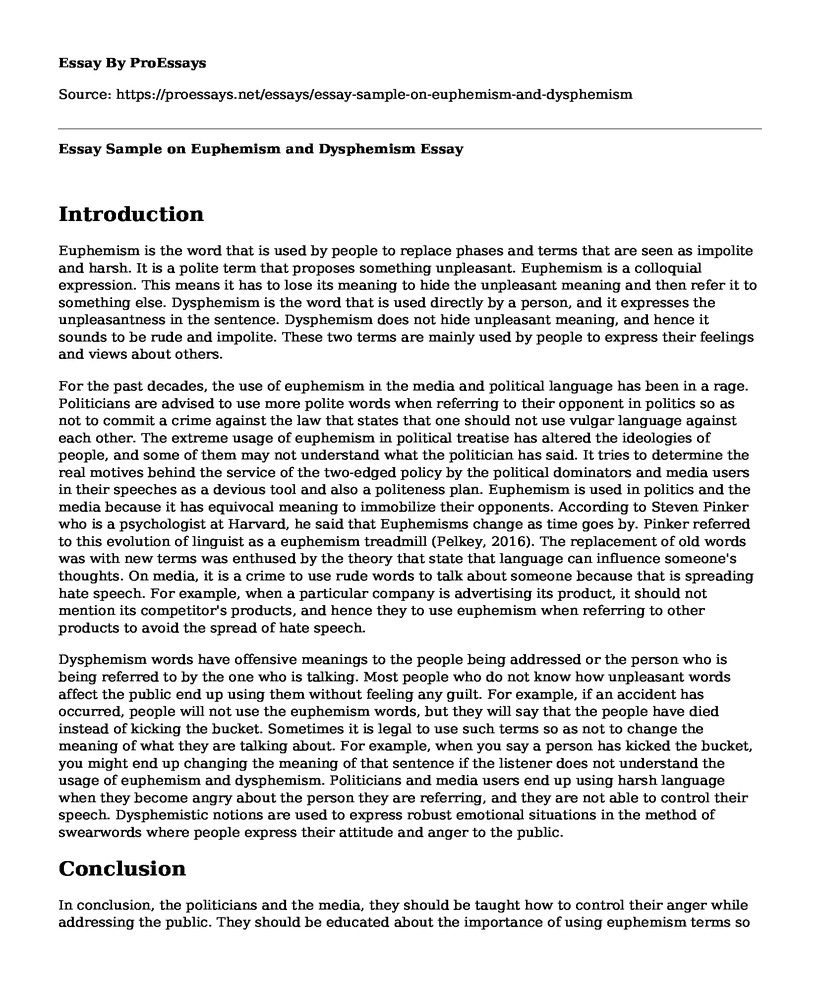Introduction
Euphemism is the word that is used by people to replace phases and terms that are seen as impolite and harsh. It is a polite term that proposes something unpleasant. Euphemism is a colloquial expression. This means it has to lose its meaning to hide the unpleasant meaning and then refer it to something else. Dysphemism is the word that is used directly by a person, and it expresses the unpleasantness in the sentence. Dysphemism does not hide unpleasant meaning, and hence it sounds to be rude and impolite. These two terms are mainly used by people to express their feelings and views about others.
For the past decades, the use of euphemism in the media and political language has been in a rage. Politicians are advised to use more polite words when referring to their opponent in politics so as not to commit a crime against the law that states that one should not use vulgar language against each other. The extreme usage of euphemism in political treatise has altered the ideologies of people, and some of them may not understand what the politician has said. It tries to determine the real motives behind the service of the two-edged policy by the political dominators and media users in their speeches as a devious tool and also a politeness plan. Euphemism is used in politics and the media because it has equivocal meaning to immobilize their opponents. According to Steven Pinker who is a psychologist at Harvard, he said that Euphemisms change as time goes by. Pinker referred to this evolution of linguist as a euphemism treadmill (Pelkey, 2016). The replacement of old words was with new terms was enthused by the theory that state that language can influence someone's thoughts. On media, it is a crime to use rude words to talk about someone because that is spreading hate speech. For example, when a particular company is advertising its product, it should not mention its competitor's products, and hence they to use euphemism when referring to other products to avoid the spread of hate speech.
Dysphemism words have offensive meanings to the people being addressed or the person who is being referred to by the one who is talking. Most people who do not know how unpleasant words affect the public end up using them without feeling any guilt. For example, if an accident has occurred, people will not use the euphemism words, but they will say that the people have died instead of kicking the bucket. Sometimes it is legal to use such terms so as not to change the meaning of what they are talking about. For example, when you say a person has kicked the bucket, you might end up changing the meaning of that sentence if the listener does not understand the usage of euphemism and dysphemism. Politicians and media users end up using harsh language when they become angry about the person they are referring, and they are not able to control their speech. Dysphemistic notions are used to express robust emotional situations in the method of swearwords where people express their attitude and anger to the public.
Conclusion
In conclusion, the politicians and the media, they should be taught how to control their anger while addressing the public. They should be educated about the importance of using euphemism terms so as not to insult their opponents and also to avoid vulgar language. If the use of dysphemism words is required, they should learn how to address it more politely so that they cannot change the meaning of what they are talking about.
References
Pelkey, J. (2016). Chiastic antisymmetry in language evolution. The American Journal of Semiotics, 29(1/4), 39-68.
Bakhtiar, M. (2016). Pour water where it burns. Metaphor and the Social World, 6(1), 103-133.
Cite this page
Essay Sample on Euphemism and Dysphemism. (2022, Dec 22). Retrieved from https://proessays.net/essays/essay-sample-on-euphemism-and-dysphemism
If you are the original author of this essay and no longer wish to have it published on the ProEssays website, please click below to request its removal:
- My Volunteer Experience Essay
- Is College Worth the Cost? - Essay Sample
- Focus Child Case Analysis Paper Example
- Deciding a University: High School Students' Hardest Decision - Essay Sample
- Essay on Inclusive Education: Achieving Social & Academic Success for Children With Disabilities
- Paper Sample on Excelling Academically: Achieving Success Despite Humble Beginnings
- Report Evaluating Opioid Prevention Programs in Elementary Schools: Considerations and Methodology







